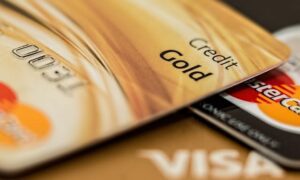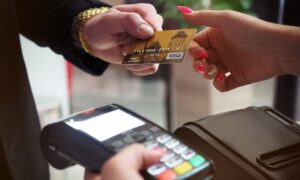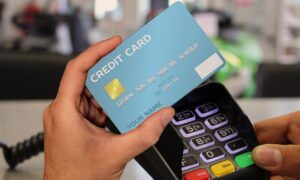Keeping your credit card information safe is crucial in protecting yourself from potential fraud and unauthorized transactions. Here are some important tips by Bankomat to help you safeguard your credit card information:
- Keep your physical cards secure: Treat your credit cards as valuable items and keep them in a safe place. Avoid leaving them unattended or visible in public areas. If your card is lost or stolen, report it to your credit card issuer immediately.
- Memorize your PIN: Avoid writing down your Personal Identification Number (PIN) and instead commit it to memory. This reduces the risk of someone accessing your card if it is lost or stolen.
- Be cautious with card details: Be mindful of who you share your credit card information with. Only provide your card details to trusted and reputable merchants during legitimate transactions. Avoid sharing your card information over unsecured or unfamiliar websites, emails, or phone calls.
- Protect your online transactions: When making online purchases, ensure that you are on a secure website. Look for “HTTPS” in the website URL, which indicates a secure connection. Avoid entering credit card details on websites that do not have proper security measures in place.
- Use strong and unique passwords: When creating accounts for online shopping or payment platforms, use strong, unique passwords. Incorporate a combination of letters, numbers, and special characters. Avoid using easily guessable information, such as your name or birthdate. Consider using a reliable password manager to securely store and manage your passwords.
- Be cautious with public Wi-Fi: Avoid entering credit card information or conducting sensitive transactions when connected to public Wi-Fi networks. These networks may be vulnerable to hackers who can intercept your data. If necessary, use a virtual private network (VPN) to encrypt your connection and enhance security.
- Regularly review your statements: Review your credit card statements regularly to ensure that all charges are accurate and authorized. If you notice any unfamiliar transactions, contact your credit card issuer immediately.
- Monitor your accounts online: Take advantage of online banking services offered by your credit card issuer. Regularly monitor your accounts for any suspicious activity, such as unauthorized transactions or changes to your personal information.
- Be cautious with paper receipts: Safely dispose of paper receipts that contain your credit card information. Shred or destroy them to prevent potential identity theft.
- Enable transaction alerts: Consider setting up transaction alerts with your credit card issuer. These alerts can notify you of any activity on your account, allowing you to quickly identify and report any unauthorized transactions.
- Regularly update your software: Keep your devices, operating systems, and antivirus software up to date. Regular updates often include security patches that address known vulnerabilities.
- Report lost or stolen cards immediately: If your credit card is lost or stolen, report it to your credit card issuer immediately. They can cancel the card and issue a replacement to prevent unauthorized use.
By following these tips, you can take proactive steps to keep your credit card information safe and protect yourself from potential fraud. Stay vigilant, be cautious with your card details, and promptly report any suspicious activity to your credit card issuer.
Use your credit card for emergencies only
Using your credit card responsibly is crucial for maintaining a healthy financial situation. Here are two important tips to consider:
- Use your credit card for emergencies only: It’s wise to reserve your credit card for genuine emergencies and unexpected expenses. These could include major car repairs, medical bills, or urgent home repairs. By using your credit card for emergencies only, you can avoid accumulating unnecessary debt and keep your credit utilization low.
- Don’t use your credit card to buy things you can’t afford: One of the common pitfalls of credit card usage is falling into the trap of purchasing items or experiences beyond your means. It’s important to have a clear understanding of your financial situation and avoid using your credit card to make purchases that you cannot afford to pay off in full when your billing statement arrives.
Instead, consider the following alternatives:
- Create an emergency fund: Establishing an emergency fund can provide you with a financial safety net to cover unexpected expenses. By setting aside a portion of your income regularly, you can build up a fund that can be used for emergencies, eliminating the need to rely solely on your credit card.
- Budget and plan your purchases: Develop a budget that aligns with your income and financial goals. Prioritize your expenses and plan your purchases accordingly. This will help you avoid impulsive buying decisions and ensure that you are spending within your means.
- Save up for larger purchases: If there are big-ticket items or experiences you desire, save up for them instead of relying on your credit card. Set specific savings goals and allocate a portion of your income towards achieving those goals. This way, you can make the purchase with cash or a debit card, avoiding credit card debt.
- Track your expenses: Regularly monitor and review your expenses to gain a better understanding of your spending habits. This will help you identify areas where you can cut back and save money. By being mindful of your spending, you can avoid relying heavily on your credit card.
Remember, responsible credit card usage involves using credit as a tool to build a positive credit history and manage your finances effectively. It’s essential to exercise discipline and make informed financial decisions that align with your long-term goals. By using your credit card for emergencies only and avoiding purchases beyond your means, you can maintain control of your finances and avoid unnecessary debt.



































